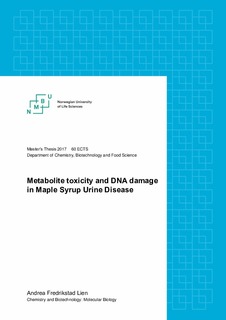| dc.contributor.advisor | Eide, Lars | |
| dc.contributor.advisor | Diep, Dzung Bao | |
| dc.contributor.author | Lien, Andrea Fredrikstad | |
| dc.date.accessioned | 2017-10-06T11:28:46Z | |
| dc.date.available | 2017-10-06T11:28:46Z | |
| dc.date.issued | 2017 | |
| dc.identifier.uri | http://hdl.handle.net/11250/2458948 | |
| dc.description.abstract | Maple Syrup Urine Disease (MSUD) is a metabolic disease where the branched-chain amino acids (BCAAs) and their corresponding branched-chain α-keto acids (BCKAs) accumulates in the cells, because they have a defective branched-chain α-keto acid dehydrogenase (BCKD) complex, which is unable to degrade BCKAs. Norwegian patients are frequently defective in the E2 subunit of the BCKD. In several studies, the toxicity of accumulating BCAAs and BCKAs have been associated with oxidative stress and DNA damage, and therefore, it was investigated if fenofibrate and branched-chain fatty acids (BCFAs) could reduce the toxicity of BCAAs and BCKAs. Fenofibrate have been shown to reduce oxidative stress in previous studies, and because MSUD cells have been shown to lack BCFAs, treating MSUD cells with BCFAs might reduce the oxidative stress observed in the cells. The study aimed to determine if the toxicity of BCAAs and BCKAs are caused by DNA damage or by lack of downstream metabolites (e.g. BCFAs). Thus, the study investigated if fenofibrate and BCFAs could reduce oxidative stress and toxicity of BCAAs and BCKAs.
E2-deficient human haploid cells (HAP1) were used as model for MSUD, and repair-deficient mouse embryonal fibroblasts (MEF) were used to study the effect of DNA damage further. Both HAP1 and MEF cells were exposed to BCAAs and BCKAs and co-exposed to fenofibrate and BCFAs before they were studied in sensitivity assays and DNA damage analyses. Menadione-treatment was also used to study the effect of oxidative stress further, and to test if BCFA and fenofibrate reduced oxidative stress in cells.
Both WT and E2-deficient cells were more sensitive to BCKAs than BCAAs. The E2 subunit provided protection against menadione, but not against BCKAs. BCFA and fenofibrate made WT and E2-deficient cells equally sensitive to BCKAs, but BCFA and fenofibrate did not have any effect on menadione sensitivity. BCKAs had no significant effect on DNA damage in HAP1 cells. Repair-deficient cells were stimulated by BCKAs, and BCFAs restored normal sensitivity to BCKAs. The BCKAs induced nuclear DNA damage in repair-deficient MEFs.
The toxicity of BCKAs was not correlated to increased DNA damage levels. The E2 protein did protect cells against oxidative stress, but not against BCKAs. BCFAs and fenofibrate did not reduce oxidative stress in HAP1 cells, but they made WT and E2-deficient cells equally sensitive to BCKAs. | nb_NO |
| dc.description.abstract | Maple syrup urine disease (MSUD) er en metabolsk sykdom hvor forgrenede aminosyrer (BCAA) og deres korresponderende forgrenede α-ketosyrer (BCKA) akkumuleres i cellene, fordi branched-chain α-keto acid dehydrogenase (BCKD) komplekset ikke klarer å bryte ned BCKA. BCKD-subenheten, E2, er ofte mutert i norske MSUD pasienter. Flere studier har indikert en assosiasjon mellom toksisiteten til akkumulerende BCAA og BCKA med oksidativt stress og DNA skade, og derfor ble det undersøkt om fenofibrat og forgrenede fettsyrer (BCFA) kunne redusere toksisiteten av BCAA og BCKA. Tidligere studier har vist at fenofibrat reduserer oksidativt stress, og siden mangel av BCFA har blitt observert i MSUD-celler, vil BCFA-behandling av MSUD-celler kanskje redusere oksidativt stress i cellene. Formålet med studiet var å bestemme om toksisiteten til BCAA og BCKA forårsakes av DNA skade eller om den skyldes mangel av andre metabolitter (e.g. BCFA). Dermed ble det også undersøkt om fenofibrat og BCFA kunne redusere oksidativt stress og toksisiteten av BCAA og BCKA.
E2-defekte humane haploid-celler (HAP1) ble brukt som modell for MSUD, og reparasjonsdefekte mus-embryonale fibroblaster (MEF) ble brukt for å studere nærmere hvordan DNA-skade påvirker celler. Både HAP1- og MEF-celler ble eksponert for BCAA og BCKA, og samtidig behandlet med fenofibrat og BCFA, før de ble undersøkt med sensitivitetsassay og DNA-skade analyser. Menadione-behandling ble også brukt for å studere effekten av oksidativt stress nærmere, og for å se om BCFA og fenofibrate reduserte oksidativt stress i cellene.
Både WT og E2-defekte celler var mer sensitive til BCKA enn BCAA. E2-subenheten beskyttet mot menadione, men ikke mot BCKA. BCFA og fenofibrat gjorde WT og E2-defekte celler like sensitive til BCKA, men BCFA og fenofibrat hadde ingen effekt på menadione-sensitivitet. BCKA hadde ingen signifikant effekt på DNA-skade i HAP1-celler. Reparasjonsdefekte celler ble stimulert av BCKA, og BCFA gjenopprettet normal sensitivitet til BCKA. BCKA induserte nukleær DNA-skade i reparasjonsdefekte MEF.
BCKA-toksisiteten var ikke knyttet til økt DNA-skadenivå i cellene. E2-proteinet beskyttet cellene mot oksidativt stress, men ikke mot BCKA. BCFA og fenofibrat reduserte ikke oksidativt stress i HAP1-celler, men de gjorde WT og E2-defekte celler like sensitive til BCKA. | nb_NO |
| dc.language.iso | eng | nb_NO |
| dc.publisher | Norwegian University of Life Sciences, Ås | nb_NO |
| dc.rights | Attribution-NonCommercial-NoDerivatives 4.0 Internasjonal | * |
| dc.rights.uri | http://creativecommons.org/licenses/by-nc-nd/4.0/deed.no | * |
| dc.subject | MSUD | nb_NO |
| dc.subject | BCAA | nb_NO |
| dc.subject | BCKA | nb_NO |
| dc.subject | DNA damage | nb_NO |
| dc.subject | HAP1 | nb_NO |
| dc.subject | BCFA | nb_NO |
| dc.subject | Fenofibrate | nb_NO |
| dc.subject | Mitochondrial DNA | nb_NO |
| dc.subject | Cell sensitivity | nb_NO |
| dc.title | Metabolite toxicity and DNA damage in maple syrup urine disease | nb_NO |
| dc.type | Master thesis | nb_NO |
| dc.source.pagenumber | 68 | nb_NO |
| dc.description.localcode | M-KB | nb_NO |

